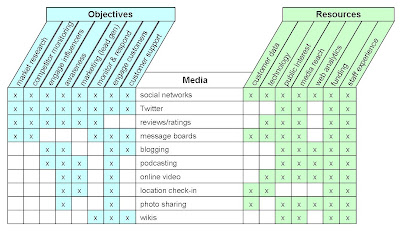 I’ll be giving a Webinar on March 23 (register here) with Neolane about cross channel marketing. At least that’s the official topic. In my mind, it’s really about helping marketers choose among the ever-increasing media options available today and in the future.
I’ll be giving a Webinar on March 23 (register here) with Neolane about cross channel marketing. At least that’s the official topic. In my mind, it’s really about helping marketers choose among the ever-increasing media options available today and in the future.I won’t go into the details of the presentation, but thought I’d share this chart for selecting among social media.
 The chart makes two major points:
The chart makes two major points:- different social media meet different business objectives. I suppose this is self-evident, but it still helps to think about this systematically when you’re trying to decide which to explore. As the chart indicates, most social media can in fact serve more than one objective. Incidentally, the chart lists the objectives in roughly the sequence of the customer life cycle, starting with market preparation activities at the left and moving through purchase and post-purchase support, which further helps you visualize where a particular project fits into your larger customer treatment strategy. You may disagree with particular details on this chart, but that’s less the point than thinking about putting each medium into a larger context.
- media must be matched to your resources. This is also pretty obvious, but, again, it’s easy to ignore it when considering your options. It's also worth pointing out that resources include more than data, technology and experience. My list also includes public interest in your topic and media reach (i.e., your firm’s ability to attract attention to its program, largely by paid advertising). Both make possible social programs that would otherwise fail because no one would participate. It's worth noting that funding can make up for shortfalls in other areas and that strengths in other areas reduce the need for funds.
An Example
The table below gives a simple example of these ideas in action. It analyzes the situation of a hypothetical company facing a major product recall. Objectives in this case are “monitor and respond” to public opinion and provide “customer support” to previous buyers. Highlighting these shows that social networks, Twitter, message boards and Wikis are appropriate options. But let’s assume it’s a small company, with limited media reach and funding, and that it also lacks technology and experience for social networks and Wikis. This leaves Twitter and message boards as the best candidates -- Twitter because there's very little technology involved, and message boards because we assume that company has the necessary resources in place.

Although this example is limited to social media, the same approach can be applied to other media as well. Tune into the Webinar for more details.


No comments:
Post a Comment